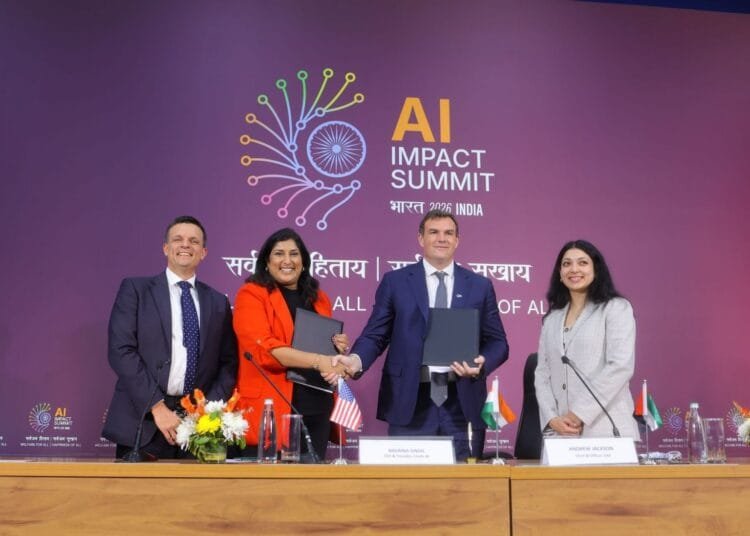Cooperation in regulatory and supervisory technology
India continues to work on several fronts to be a leading digital economy globally with a multi-prong approach at home and abroad, according to India’s High Commissioner Jawed Ashraf.
“We are using our public digital infrastructure, rated as the largest in the world, to take a leap into digital economy to achieve our public policy and economic goals at home and connect globally,” Jawed Ashraf told an online Fintech forum on 26 May 2020.
Building its global reach, India has offered US$1 billion to ASEAN for digital connectivity projects in the 10-member countries, the envoy told some 700 participants from 34 countries at the “SFF Green Shoots Series: Cross-border collaboration between the ASEAN region and India, UK, Denmark and Sweden” held from Singapore via zoom.
“Building digital connectivity and partnerships with Singapore and ASEAN countries, including through Singapore, are priorities for India, as we seek to deepen engagement with a regional grouping of some 660 million people with strong heritage links with India,” he said.
Jawed Ashraf, highlighted several initiatives with Singapore such as interoperability of payment systems, with Singapore being the first country to see the launch of RuPAY in 2018 and BHIM QR at the Singapore Fintech Festival (SFF) last year, and Singapore’s NETS cards likely to be accepted in India soon.
The two sides are also working on connecting India’s Unified Payment Interface (UPI) with Singapore’s FAST system, which will make remittances to India seamless and efficient.
India is also collaborating with Singapore on building a digital hub, Business Sans Border, that will connect MSME companies in India online to global supply chains and markets, particularly in the ASEAN market.
During his November 2018 visit to Singapore, Prime Minister Narendra Modi delivered the keynote address at the Singapore Fintech Festival and launched the APIX platform, an initiative of the ASEAN Financial Innovation Network (AFIN) supported by the International Finance Corporation (IFC), the Monetary Authority of Singapore (MAS), and the ASEAN Bankers Association (ABA) as founding members. The platform links fintech companies with international financial institutions.
Jawed Ashraf underlined APIX importance for India as a link with global markets through ASEAN, pointing out that Indian fintech companies account for 40 percent of the 200 fintech companies that are members in APIX. “This will connect our fintech companies with international banks.”
The next step is building on India Stack to create a Global Stack, with solutions for governance, financial inclusion, delivery of public services, and digitalization of payments, which can be offered to countries in Asia and elsewhere.
“Cooperation in regulatory and supervisory technology, including sandbox models, is also moving forward through the India-Singapore Joint Working Group on Fintech”.
The envoy delved during the hour-long session on building relationships in digital space, citing how Indian Fintech companies and startups have gained ‘strong foothold’ through events in Singapore.
The Indian High Commission launched “Inspreneur”, an India-Singapore Entrepreneurship Bridge in 2018, which has been held three times bringing a large number of startups from India to join the Singapore and ASEAN startup community, together with technology experts, investors and innovation hubs. Atal Innovation Mission and Startup India, along with Enterprise Singapore, are also supporting the initiative between the two countries.
Singapore has also set up a Global Innovation Alliance centre in Bengaluru to help Singapore startups enter the large and rapidly growing Indian market.
The ground-level support for technologies, innovations, fintech, and startups has been strong and is growing, according to Jawed Ashraf.
At Prime Minister Modi’s suggestion, India-Singapore Hackathon was launched in 2018. The third edition in 2020 will be expanded to cover ASEAN.
Jawed Ashraf also highlighted the various elements of the economic package in India to deal with COVID 19, amounting to 10% of the GDP and the structural reforms introduced across a wide range of sectors.
Injection of liquidity into specific sectors, NBFCs, and the banking sector will help kick-start the economy, he added.
Commenting on the role of technology and startups in the COVID situation, he said that technology has been used effectively to achieve public policy goals.
Jawed Ashraf pointed out that US$5 billion was transferred to 160 million beneficiaries into their accounts in the first three weeks of its launch earlier this month.
Aarogya Setu, a contact tracing app, has helped keep up with managing the spread of coronavirus across the country.
In home-based learning, as mandated in managing the COVID-19 spread, e-vidya and Diksha have drawn 640 million hits since its launch on March 24, 2020.
New initiatives like the portability of e-ration cards for a migrant worker will cover 640 million beneficiaries by August 2020 and the entire country by March 2021.
Elsewhere, e-trading for the agriculture sector and e-marketplace for MSMEs are being planned.
Digital technology has been an important instrument in the past five years for economic transformation and for empowerment, access and inclusion, said Jawed Ashraf. It will play a key role in economic recovery after the pandemic. fiinews.com










